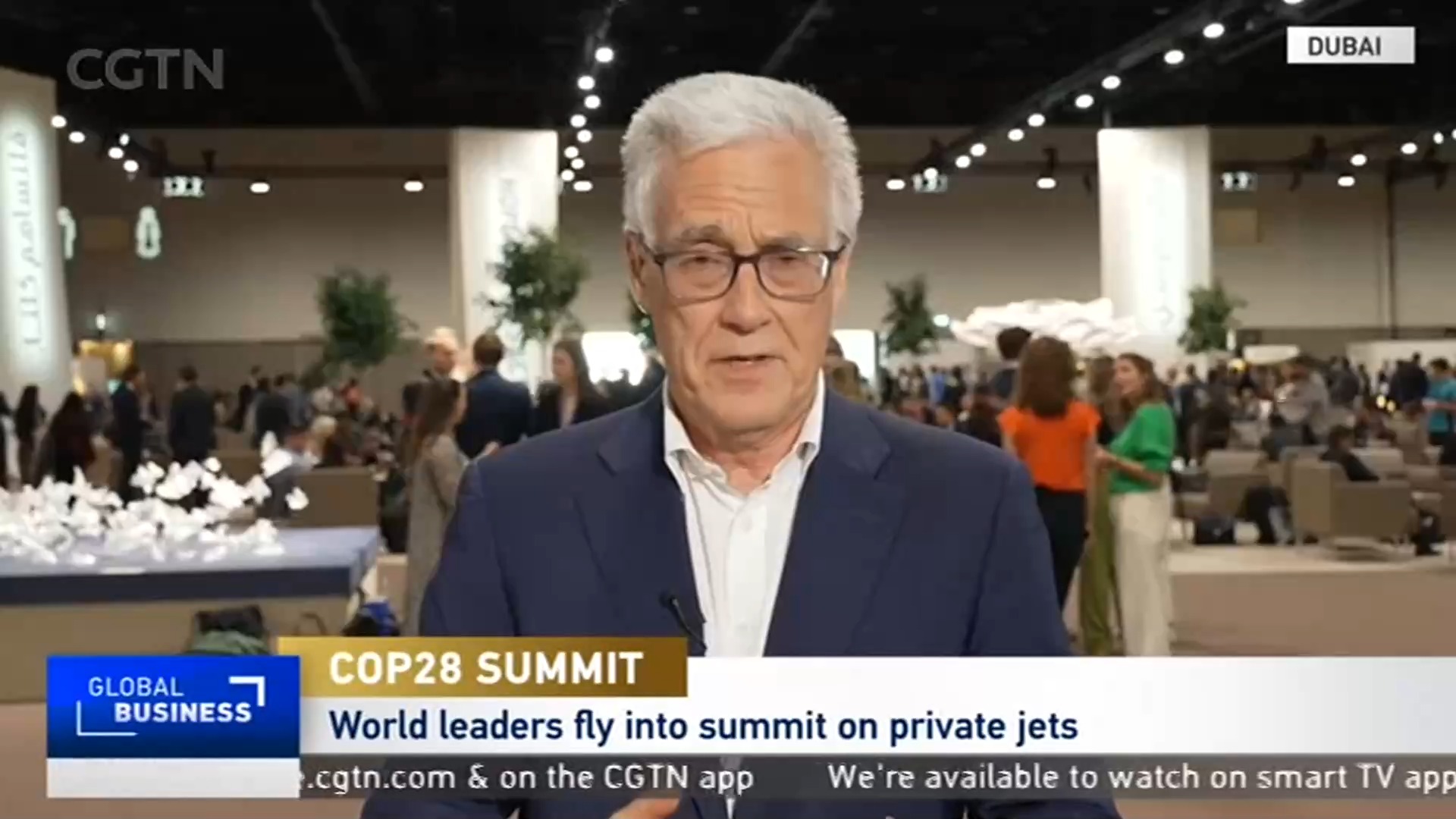02:47

The head of a leading climate think tank has slammed the use of private jets by delegates arriving to COP28 and said they should be banned from attending future events in this way unless they use sustainable fuel.
Adair Turner, chair of the Energy Transitions Commission (ETC), a highly-respected international think tank focusing on economic growth and climate change mitigation, said the use of private jets had caused "a real problem of perception."
COP28, the U.N. climate summit in Dubai, is seeing countries under pressure to come up with plans to halt the non-stop rise in planet-warming emissions. But some delegates have faced hypocrisy over their use of private flights to attend.
The UK was criticized over reports that Prime Minister Rishi Sunak, Foreign Secretary Lord Cameron, and King Charles were all taking separate private jets to the Dubai summit.

Delegates at the United Nations Climate Change Conference COP28 in Dubai. /Thaier Al-Sudani/Reuters
Delegates at the United Nations Climate Change Conference COP28 in Dubai. /Thaier Al-Sudani/Reuters
Turner, a member of the UK House of Lords, told CGTN's Jamie Owen: "Here's what I would recommend for all future COPs. I think they should say that anybody arriving on a private jet is only allowed to attend the cop if they can produce certifiable proof that it was using sustainable aviation fuel and if not to pay a tax equal to the difference between the cost of sustainable aviation fuel and conventional fuel, with all that money to go into a fund to help decarbonization in lower income countries."
He added: "I do think the rich of the world have got to start walking the talk. They've got to actually start living up to the principles. They say they want to deal with climate change. You can't do that and come in by private jet to a major climate conference on anything other than new sustainable zero carbon aviation fuel."
Turner also said that without agreements to drastically cut fossil fuel, COP28 risked being a waste of time. He said: "I don't think there's any way we are going to limit climate change by getting to net zero emissions by mid-century unless we very significantly reduce the use of fossil fuels.
"Any idea that we can get there primarily by continuing to use fossil fuels, but offsetting that with carbon capture and storage or removals, that is a delusion, it's incredible and implausible."
He said that despite there being a role for carbon capture and storage, "the really heavy lifting" must be achieved by large reductions in fossil fuel use.
According to Turner: "We should be aiming for something like a 55 to 70 percent reduction in gas use by 2050, 85 to 90 percent reduction in coal use, and somewhere between an 85 and a 90 percent reduction in the use of oil."
He added: "If we don't get those commitments, I think we're really not taking this seriously."
READ MORE:
'It's a gimmick, not a game-changer' – Virgin's SAF flight questioned
Burning fossil fuels causes one death every five seconds, says WHO
Disease a huge risk in Gaza without prolonged truce, says UNICEF
Some 117 governments pledged to triple the world's renewable energy capacity by 2030 at the summit on Saturday, as a route to cut the share of fossil fuels in the world's energy production.
The pledge was among a slew of COP28 announcements on Saturday aimed at decarbonizing the energy sector - source of around three-quarters of global greenhouse gas emissions - that included expanding nuclear power, cutting methane emissions, and choking off private finance for coal power.
Led by the European Union, United States and UAE, the pledge also said tripling renewable energy would help remove CO2-emitting fossil fuels from the world's energy system by 2050 at the latest.
Backers on Saturday included Brazil, Nigeria, Australia, Japan, Canada, Chile and Barbados.
The pledge also called for "the phase down of unabated coal power" and an end to the financing of new coal-fired power plants. It included a target to double the global rate of energy efficiency by 2030.
Climate vulnerable countries insisted that the goals must be paired with a deal among countries at COP28 to phase out the world's use of fossil fuels.
More than 20 nations also signed a declaration on Saturday aiming to triple nuclear power capacity by 2050, with U.S. climate envoy John Kerry saying the world cannot achieve "net zero" emissions without building new reactors.
Meanwhile, nearly 50 oil and gas companies including Exxon Mobil signed the Oil and Gas Decarbonization Charter, an initiative driven by COP President Sultan al-Jaber to cut operational emissions by 2050.
The charter was criticized by environmental groups who said the commitments were merely a distraction from the COP28 process and fail to deal with the emissions caused by burning fossil fuels.
The Biden administration on Saturday also unveiled final rules aimed at cracking down on U.S. oil and gas industry releases of methane, part of a global plan to rein in emissions that contribute to climate change.
Meanwhile, several governments, philanthropies, and the private sector said they have mobilized $1 billion in grants to supports countries' efforts to tackle the potent gas.

Subscribe to Storyboard: A weekly newsletter bringing you the best of CGTN every Friday
Source(s): Reuters